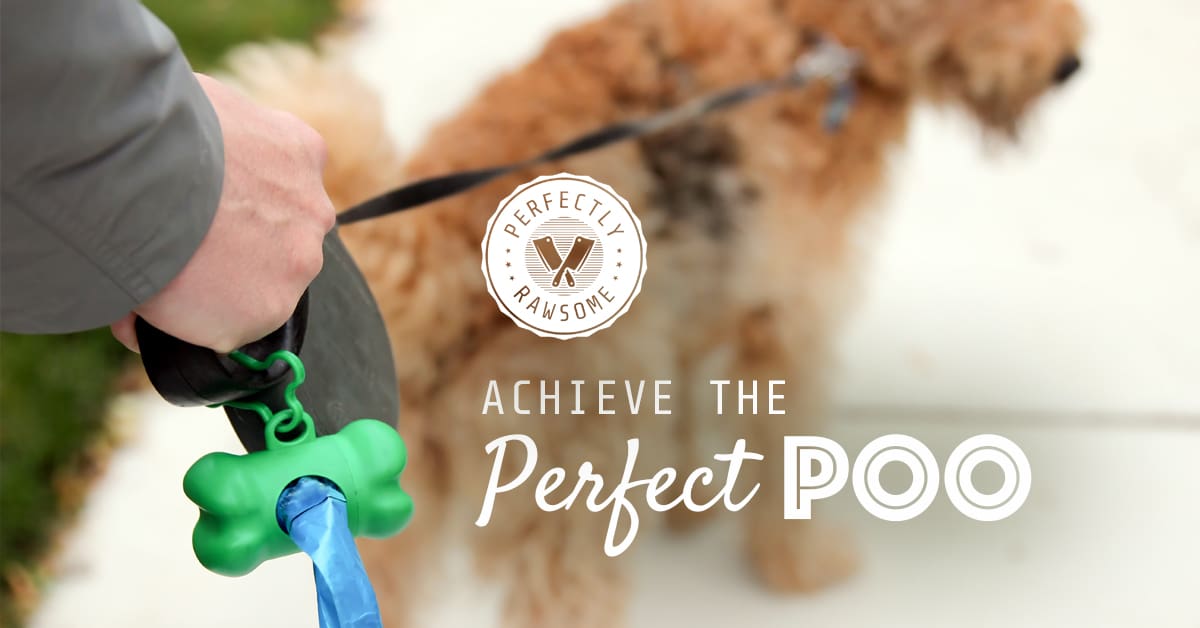Although not very glamorous, stool consistency and color can speak volumes about a pet’s diet and health. Monitoring a pet’s stool can help pet parents determine how well the raw diet is tolerated and if any adjustments are needed.
Raw foods added to a dog’s or cat’s meal can directly affect stool production. It is recommended to monitor stool production and consistency throughout the transition and when introducing new foods. This enables the pet parent to identify any problem areas that need adjustments. Achieving the perfect poo relies on multiple factors:
Identify Stool Outcome
Identify multiple variables that produce different stool consistencies.
Diarrhea
Diet adjustments to alleviate soft stool and diarrhea.
Constipation
Diet adjustments to alleviate extra hard or dry stool and constipation.
Supplemental Support
Supplemental support to maintain a regular elimination schedule and consistency.
Once multiple variables are identified and adjustments are made for individual requirements, achieving the perfect poo is a sure sign the pet is tolerating the new diet without any digestive complications.

Identify Stool Outcome
The ingredients fed in a raw diet will directly affect the outcome of the stool once digestion is complete and the pet eliminates the waste. The color of stool may be alarming if pet parents are not prepared with what to expect.
Yellow Stool
Feeding a diet high in poultry such as chicken or turkey can cause yellow-colored stool. When transitioning an adult dog over to raw using poultry, expect yellow or light colored stools the first week.
Dark Brown Stool
Red meat can cause very dark brown stool. When incorporating more red meats, expect stool to become darker in color.
Dark Black Stool
A meal containing a lot of blood will result in black stool. The excess blood from the raw diet oxidizes in the colon, resulting in very dark stool. Organs such as liver and spleen have high amounts of blood present and can make stools darker.
Tar-Like Stool
If stool is dark black and loose, it is likely that too much organ has been fed. Follow the recommended transition steps regulate the stool.
White/Grey, Chalky Stool
If stool is hard and chalky, or dry and crumbly, it is likely that too much bone has been. Feed 1 boneless meal and return to regular feedings with slightly lower bone content.
Stool color and consistency will assist in determining if the pet is tolerating the raw diet. Stool consistencies may vary day-to-day depending on the ingredients fed prior to elimination. However, adjustments to the diet are necessary if the pet’s stool consistency is frequently too loose or too hard.
Diarrhea
Dogs and cats alike may occasionally get loose stools which can be caused by a variety of factors. When pets have loose stools, be sure to consider all variables that may have resulted in diarrhea.
High Sodium, Enhanced, & Seasoned Meats
Always check the label of the raw ingredients. Many poultry and pork products in the United States are enhanced with a sodium nitrate solution. This increases the sodium content in the product itself and will result in diarrhea in dogs and cats. Ensure grocery store meats are 100mg sodium per 4oz (114g) serving size or less. If a label is not provided, ask the butcher for more information on the sodium content.
Too Much Fat
Some pets are sensitive to high amounts of raw fat. In this case, remove the skin on poultry products. Remove the excess fat from raw meat and select leaner meats above fattier cuts.
Too Much, Too Soon
When adding something new to a pet’s raw diet, take the introduction slow. Introduce new items slowly to allow time to adjust. Adding liver and organs to a raw diet may also cause loose stools. It is recommended to start with 1/4 of the recommended ratio and gradually increase over time until full ratios are achieved.
Not Enough Bone for Calcium
10% raw edible bone is the guideline for adult dogs and 6% raw edible bone is the guideline for adult cats. Some pets may require more than these recommended ratios to maintain firm stool. Increase bone slightly until stools remain firm and consistent.
Parasites & Protozoa
Be sure to rule out parasites and protozoa if the pet has a sudden onset diarrhea and the diet has not changed. If the pet has come in contact with contaminated water, feces or other infected animals, then a parasite or protozoa could be the cause of diarrhea.
Food Intolerances or Allergies
Diarrhea can occasionally be a symptom of a food intolerance or allergy. An elimination diet may be useful in these circumstances.
Remedy Recommendations
There are several steps to address diarrhea. However, it is important to seek veterinary care if the pet has loose stools for more than 24 hours paired with lethargy, pale gums, and refusing to drink water.
Fasting
A 24-hour fast is an excellent approach to adult dogs and cats who are experiencing diarrhea. Broth, slippery elm bark, and probiotics can be given during the fast day but it is best to avoid solid foods. Puppies and kittens should not be fasted for 24-hours. Skipping 1 meal is acceptable, but young developing puppies and kittens should not go more than 24-hours without food.
Feed What Works
If a new food has been introduced which resulted in loose stools, stop feeding the new food it until the dog or cat has regulated its stool for 3-4 days. Be sure to introduce new items slowly and increase the amounts being fed only when stools remain firm.
Vet Check
Always make sure the pet is free of parasites and protozoa. Follow the veterinarian’s recommendations for treatment if there is a confirmed parasitic or protozoa infection.
Meat, Bone, & Fibrous Foods Only
Eliminate organs and other unnecessary additional ingredients when diarrhea occurs. Adjust meals to only include lean muscle meat, raw meaty bones, and fiber-based vegetables to firm the stool consistency. This should only be implemented temporarily for adult dogs.
Digestive Support
Add in digestive supplemental support such as slippery elm, digestive enzymes and probiotics.
A feeding diary is ideal for dogs and cats who frequently have diarrhea. This allows the pet parent to document each meal fed, all ingredients, and the stool consistency to follow. Tracking the diet and stool provides an avenue to pinpoint any ingredients in the diet that may be causing digestive upset. Always adjust to the pet’s individual needs and eliminate all foods from the diet that consistently cause loose stools.
Constipation
Constipation instead of diarrhea may also occur in raw fed pets. Overfeeding calcium-based foods such as raw meaty bones will result in hard, crumbly and chalky stools. Many pets are capable of eliminating hard stools. However, constipation is possible when too much bone has been fed.
More often than not, stool consistency will become extremely hard when pets have consumed too much calcium. Stool may also resemble small pebbles or rocks and it may be light grey or even white.
Remedy Recommendations
There are a few steps to address constipation. However, seek veterinary care if the pet has been straining to defecate without success for more than 24 hours.
Boneless Meat & Organs Only
Eliminate raw meaty bones and other unnecessary additional ingredients when constipation occurs. Adjust meals to only include muscle meat and organs temporarily. The boneless muscle meat and organs have a laxative effect and will assist in bowel movements.
Slippery Elm Bark Powder (SEB)
The inner bark of the Slippery Elm tree is known for its medicinal properties to help sooth digestive issues. SEB lubricates the colon wall and helps with the elimination of stool during constipation.
A feeding diary is ideal for dogs and cats who frequently have constipation. This allows the pet parent to document each meal fed, all ingredients, and the stool results. Tracking the diet and stool provides an avenue to determine how much raw meaty bone the pet can tolerate. Always adjust to the pet’s individual needs and reduce the amount of raw meaty bones or change the type of raw meaty bone being fed if the diet consistently causes constipation.
Supplemental Support
There are several supplements which are beneficial in aiding with digestion to prevent diarrhea as well as treat constipation.
Digestive Enzymes
Raw proteins and raw fats are different than protein and fat found in a processed diet. Some pets need additional assistance with digesting a new food source. The addition of digestive enzymes may aid in digestion.
Probiotics
Probiotics help to keep the gut biome diverse in beneficial bacteria. This provides some protection against ingested pathogens and helps with the digestion of food within the colon. Fermented vegetables and milk (kefir) are a great source of naturally occurring probiotics. Alternatively, a probiotic supplement can be used.
Slippery Elm Bark (SEB)
SEB has dual benefits in addressing diarrhea and constipation! It helps with intestinal inflammation associated with colitis from diarrhea and it also is extremely beneficial for constipation. It creates a mucous lining in the GI tract and soothes irritation. Loose powder can be found at a local health store or can be purchased online. Dosage is ¼ tsp per 10lbs (4.5kg) bodyweight.
These supplements are not requirements for raw diets. However, they can be beneficial for pets who need additional digestive support to achieve the perfect poo.
CLOSING COMMENTS
Diarrhea and constipation can happen to any pet and it is best to be informed and prepared for when it happens. Like humans, dogs and cats have individual needs that may differ from the next pet. It is important to identify these needs and adjust the diet in order to achieve the perfect poo.
